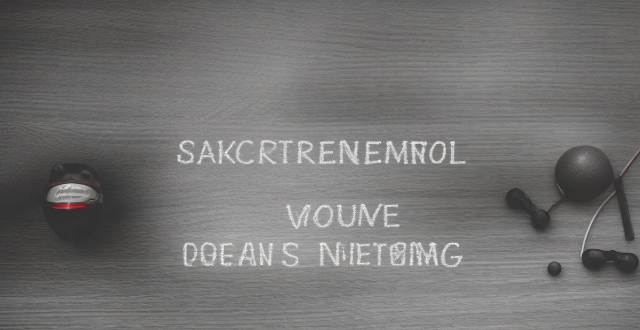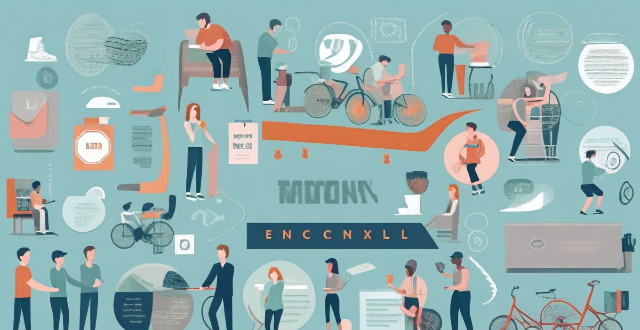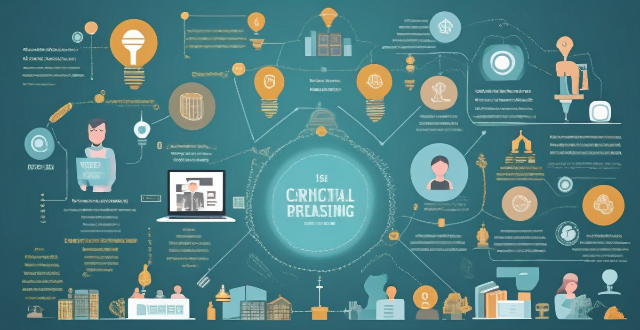Skill Career

How does lifelong learning impact career development ?
Lifelong learning is a continuous process of acquiring new knowledge and skills that can significantly impact career development. It enhances skills, adaptability, creativity, personal growth, networking opportunities, and career longevity. By engaging in lifelong learning, individuals can stay relevant in their professions, adapt to changing job requirements, and increase their chances of career success.

How does studying abroad impact a student's future career prospects ?
Studying abroad can significantly impact a student's future career prospects by enhancing cultural awareness, broadening educational horizons, providing professional advancement opportunities, and contributing to personal development. Students gain a global mindset, language skills, adaptability, and problem-solving abilities. They also benefit from academic rigor, research opportunities, independence, and confidence. Professionally, students expand their global network, gain employment advantages, and higher earning potential. Personally, they develop life skills such as time management and financial planning, along with cross-cultural competence and a desire for lifelong learning. Overall, studying abroad equips students with transferable skills that are highly valued by employers across various industries, positively influencing their career prospects.

What steps should I take to achieve my career goals ?
Achieving Your Career Goals: A Step-by-Step Guide outlines a comprehensive strategy for reaching professional objectives. It starts with defining goals by identifying interests, skills, values, and setting SMART objectives. Researching industries, networking, and understanding potential employers are emphasized. Acquiring relevant skills through education and developing soft skills is crucial. Gaining experience through internships, volunteering, and seeking mentorship is advised. Building a professional brand involves creating strong resumes, establishing an online presence, and active networking. Strategic job applications require customization and thorough interview preparation. Continuous assessment and adjustment of the career plan, staying informed, and being open to new opportunities are essential for success. Patience, perseverance, and adaptability are key traits for achieving career goals.

What is the impact of sports on the career aspirations of young people ?
Text: The Impact of Sports on the Career Aspirations of Young People Introduction - Sports are integral to society and significantly impact young people's career aspirations. - This article explores both positive and negative aspects of sports' influence on career goals. Positive Impact 1. Development of Key Skills - Teamwork, leadership, perseverance, and other skills developed through sports are beneficial in any career. 2. Increased Confidence and Self-Esteem - Success in sports can boost confidence and self-esteem, making young people more likely to pursue ambitious career goals. 3. Exposure to Diverse Opportunities - Sports open doors to various career paths and scholarships for higher education. Negative Impact 1. Pressure and Burnout - Intense focus on sports achievements can lead to excessive pressure and burnout. 2. Limited Time for Other Activities - Dedication to sports training may leave little time for exploring other interests or developing skills outside of sports. 3. Injury Risks - The risk of injury is always present in sports and can hinder a young person's ability to pursue a sports-related career or affect overall employability. Conclusion - Sports have a profound impact on the career aspirations of young people. - While they offer numerous benefits, it is essential to be aware of potential drawbacks. - Balancing sports involvement with other activities and interests allows young individuals to make informed decisions about their future career paths while enjoying the benefits of sports.

What should be included in a sports career plan ?
A comprehensive sports career plan should include personal information, career objectives, skill development, education & training, competition history, sponsorship & funding, off-field activities, health & wellness, post-retirement planning, and a conclusion. It serves as a roadmap to guide athletes through their journey in sports, ensuring they are well-prepared for every stage of their career.

How do academic competitions impact a student's future career prospects ?
Academic competitions play a crucial role in shaping students' future career prospects by developing essential skills, providing networking opportunities, and offering recognition and awards. These competitions foster critical thinking, time management, collaboration, and teamwork, which are highly valued by employers across all industries. Participating in academic competitions also allows students to connect with industry professionals and build professional relationships with their peers and competitors. Winning or performing well in these competitions can boost a student's resume and attract scholarships and grants for further education. Overall, academic competitions provide valuable experiences that can help students stand out to potential employers and lay the foundation for a successful career in their chosen field.

What steps should I take to transition out of my sports career ?
Leaving a sports career can be challenging, but careful planning and self-reflection can help. Identify your interests and passions, build your network, gain new skills and education, create a plan, and seek support when needed.

How do I identify my strengths and weaknesses for career planning ?
This guide emphasizes the importance of understanding one's strengths and weaknesses for effective career planning. It outlines methods such as self-assessment, formal assessments, and leveraging feedback from others to identify these traits. The guide then suggests ways to use this information in choosing a career path, developing strengths, and addressing weaknesses. It encourages seeking opportunities for growth and not being afraid to ask for help.

What are the benefits of hiring a sports agent for career management ?
Hiring a sports agent can bring numerous benefits to an athlete's career management, including negotiating contracts and deals, marketing and branding assistance, legal representation, and career planning and development. By working with an experienced sports agent, athletes can focus on their performance while leaving the business side of their careers in capable hands.

What are the key elements of successful sports career management ?
Managing a successful sports career involves various elements that work together to ensure the athlete's success. Key elements include goal setting, time management, skill development, mental preparation, nutrition and hydration, injury prevention and recovery, networking and relationship building, and financial management. Athletes must set both short-term and long-term goals, manage their time effectively, develop physical and technical skills, prepare mentally for competitions, maintain proper nutrition and hydration, prevent and recover from injuries, build strong relationships with coaches and teammates, and manage their finances wisely.

How can I transition into a new career field or industry ?
Transitioning into a new career field or industry requires careful planning, research, and a willingness to learn new skills. To make the transition smoother, assess your skills and interests, research potential careers, gain relevant experience through courses, certifications, volunteering, or part-time jobs, update your resume and cover letter, and apply for jobs while preparing for interviews. By following these steps, you'll be well-prepared to make a successful transition into an exciting new chapter of your professional life.

How can teacher training be tailored to support early career teachers versus more experienced educators ?
Teacher training is crucial for educators at all stages of their careers, but the needs of early career teachers differ from those of experienced educators. Early career teachers benefit from training focused on classroom management, curriculum development, instructional strategies, professional development, and mentorship programs. Experienced educators may seek training in advanced instructional methods, leadership development, technology integration, professional growth opportunities, and mentorship opportunities. Tailoring teacher training to meet the unique needs of both groups can be achieved through a variety of programs such as orientation workshops, coaching sessions, collaborative learning groups, online courses, advanced workshops, research collaborations, professional development retreats, and online learning communities. By providing tailored support, teacher training empowers educators to achieve excellence in teaching and positively impact student learning outcomes.

What role will education play in preparing individuals for future careers ?
Education is crucial for preparing individuals for future careers by developing technical and soft skills, fostering critical thinking, promoting lifelong learning, providing career guidance, offering networking opportunities, allowing for practical experience, broadening global perspectives, and contributing to personal development.

What are the long-term effects of breaches in academic integrity on one's career ?
The long-term effects of breaches in academic integrity can be severe and far-reaching, including damaged reputation, limited career opportunities, and potential legal consequences. It is essential for students, researchers, and educators to uphold the principles of academic integrity to ensure the success of their careers and the integrity of their respective fields.

What resources are available for career planning and development ?
This text provides an overview of various resources available to support career planning and development. It covers online courses, networking opportunities, mentorship programs, job boards, personal development books and podcasts, coaching services, government and non-profit resources, university career services, company ERGs, and industry publications. These resources aim to enhance skills, expand networks, and keep individuals informed about opportunities that align with their career goals.

Can nutrition affect an athlete's skill level ?
Nutrition is vital for athletes' overall well-being and performance, including skill enhancement, recovery, and injury prevention. It affects cognitive function, physical performance, and recovery, ultimately influencing an athlete's skill level. A balanced diet with proper nutrients can help athletes reach their full potential and succeed in their sports.
![Did [insert celebrity name] drop out of school to pursue their acting/music career ?](/images/3nde/389e75a9-686d-4943-a6f7-d9b486c73fbb.png)
Did [insert celebrity name] drop out of school to pursue their acting/music career ?
The article discusses whether [insert celebrity name] dropped out of school to pursue their acting/music career. It provides an overview of their early life and education, reasons for dropping out, and the consequences of this decision. The article concludes that while there were both positive and negative consequences, it ultimately depends on personal preference and priorities when deciding between education and pursuing one's passion.

What role does networking play in career planning and development ?
Networking is a crucial component in career planning and development. It involves building and maintaining relationships with people who can offer support, advice, and opportunities for professional growth. The importance of networking cannot be overstated, as it plays a significant role in various stages of one's career journey. One of the primary benefits of networking is that it helps individuals build professional relationships. These relationships can be with peers, mentors, or industry experts who can provide valuable insights and guidance. By establishing connections with these professionals, individuals can gain access to information about job openings, industry trends, and best practices. Additionally, having a strong network can help individuals navigate through challenging situations and make better decisions regarding their career path. Networking also provides opportunities for mentorship. Mentors are experienced professionals who can offer guidance, support, and advice to help individuals achieve their career goals. They can share their knowledge and expertise, provide feedback on work performance, and offer advice on how to advance in one's career. Mentors can also introduce individuals to new contacts within their network, expanding their reach even further. Another advantage of networking is that it provides access to information and resources that may not be readily available elsewhere. For example, attending industry events or joining professional organizations can expose individuals to the latest trends, technologies, and innovations in their field. This information can help individuals stay ahead of the curve and position themselves as thought leaders within their industry. Furthermore, networking can lead to collaborations and partnerships that can open up new opportunities for growth and development. Networking is essential for career advancement opportunities. Many jobs are filled through referrals from existing employees or other professionals within the company. Having a strong network increases the chances of being referred for job openings or recommended for promotions. Additionally, networking can help individuals identify potential employers or clients who share similar values and interests, making it easier to find fulfilling work that aligns with their passions and goals. Finally, networking plays a crucial role in personal branding. Building a strong personal brand requires consistent communication of one's skills, experiences, and accomplishments. Networking provides an opportunity to showcase these qualities to a broader audience, increasing visibility and credibility within the industry. By engaging with others in a professional manner and sharing valuable insights and experiences, individuals can establish themselves as thought leaders and experts in their field. In conclusion, networking is an integral part of career planning and development. It helps individuals build professional relationships, gain access to information and resources, find career advancement opportunities, and establish a strong personal brand. To maximize the benefits of networking, individuals should actively seek out opportunities to connect with others in their industry, attend events and conferences, join professional organizations, and engage with others on social media platforms. By investing time and effort into building a robust network, individuals can accelerate their career growth and achieve their professional goals.

How can I stay motivated while working towards my career goals ?
The text provides a detailed guide on how to stay motivated while working towards your career goals. It emphasizes the importance of setting clear and achievable goals, breaking them down into smaller tasks, staying organized, finding inspiration, taking care of yourself, embracing challenges, seeking support, and celebrating your successes. The tips provided in the text are practical and actionable, making it easier for individuals to maintain focus and drive throughout their career journey. Overall, the text offers valuable insights and advice on how to stay motivated and achieve success in one's career.

Can playing multiple sports help in skill development ?
Participation in multiple sports can enhance overall athleticism and skill development by improving physical attributes, reducing injury risk, developing transferable skills, and promoting mental toughness. It also offers social benefits such as expanded networks and increased opportunities for exposure. While specialization has its advantages, playing multiple sports can help athletes become well-rounded competitors.

What role does nutrition play in sports career management ?
Nutrition is a critical component in managing a sports career, as it fuels performance, supports health, aids in weight management, and contributes to mental well-being. Athletes must focus on hydration, balancing macronutrients, ensuring micronutrient intake, timing meals appropriately, and judicious use of supplements. A personalized nutrition plan can optimize training, competition outcomes, and longevity in a sports career.

How important is rest and recovery in skill enhancement ?
The text discusses the importance of rest and recovery in the process of skill enhancement. It highlights the cognitive and physical benefits of taking breaks, such as improved mental clarity, memory consolidation, muscle recovery, and injury prevention. The practical implications include avoiding burnout, enhancing performance, and strategies for incorporating rest into practice schedules. Overall, the text emphasizes that rest is a crucial component of long-term skill development and should be given equal consideration alongside deliberate practice and training regimens.

How important is mental health in managing a sports career ?
This article discusses the importance of mental health in managing a sports career. It explains how mental health affects an athlete's performance, recovery, team dynamics, off-field success, and personal growth. The article emphasizes that athletes with good mental health are more likely to set goals, work hard towards achieving them, and push through challenges. It also highlights the role of mental health in developing life skills that extend beyond an athlete's sports career. Overall, the article underscores the significance of prioritizing mental well-being for athletes to maximize their potential both as individuals and members of their teams.

What skills do I need to pursue a career in green energy ?
To pursue a career in green energy, one needs to have an understanding of renewable energy sources, familiarity with energy systems, proficiency in relevant software, data analysis and modeling skills, mechanical and electrical engineering skills, project management, sustainability practices, research and development. In addition, soft skills like communication, teamwork, problem-solving, adaptability, leadership, negotiation, creativity, perseverance, global awareness, and continuous learning are also essential.

How does scientific literacy among women influence their career choices in science and technology fields ?
Scientific literacy significantly influences women's career choices in science and technology fields by enhancing opportunities, overcoming barriers, increasing diversity, and improving representation. It enables women to access complex scientific information, develop problem-solving skills, broaden their perspectives, break stereotypes, promote equality, address biases, expand career horizons, encourage mentorship, foster collaboration, challenge underrepresentation, influence policy, and change public perceptions about the suitability of these fields for females.

How does parenthood impact the career progression of women differently than men ?
In this article, we explore how parenthood affects women's careers differently than men's due to societal expectations and stereotypes, workplace policies and practices, and networking and mentorship opportunities. Women are often expected to be the primary caregivers for their children, leading to reduced work hours or time off work, which can result in a lack of opportunities for advancement or promotions as well as a loss of income and benefits. Workplace policies and practices can contribute to the different impact of parenthood on women's careers, with many workplaces having a "one-size-fits-all" approach to parental leave and flexible working arrangements that may not accommodate the needs of all employees. Networking and mentorship opportunities are essential for career progression but can be challenging for working parents, especially women who may miss out on these opportunities due to caring for their families. To address these issues, it is crucial for employers and society as a whole to recognize and support the unique challenges faced by working parents, particularly women, by implementing more flexible work arrangements, providing adequate parental leave policies, and promoting diversity and inclusion in the workplace.

How can team sports help in individual skill development ?
Team sports contribute significantly to individual skill development by improving communication skills, enhancing leadership abilities, increasing self-confidence, bettering time management, improving social skills, promoting physical fitness and coordination, providing opportunities to learn from mistakes, and fostering adaptability.

How do I choose a tennis training camp that fits my skill level ?
Choosing a tennis training camp that fits your skill level can significantly improve your game. Here are some tips on how to select the right camp: 1. Assess your current skill level by considering your experience, strengths and weaknesses, and fitness level. 2. Research different camps that offer programs specifically designed for your skill level using online directories, social media groups, and reviews from previous attendees. 3. Check the coaches' qualifications and experience, including their credentials, coaching philosophy, and track record of working with players at your skill level. 4. Consider the quality of the camp's facilities and amenities, such as well-maintained courts, access to equipment, and onsite amenities like locker rooms and dining areas. 5. Evaluate the camp's reputation and success rate by reading reviews, asking for referrals, and contacting the camp directly to learn more about their success stories.

Is speed reading a natural ability or a skill that can be learned ?
Speed reading is a topic of interest for many individuals who wish to improve their reading efficiency and comprehension. The question arises whether speed reading is a natural ability that some people possess, or if it is a skill that can be learned and developed through practice and training. While there may be some individuals who possess a natural ability for speed reading, it is generally accepted that speed reading is a skill that can be learned and improved upon through practice and training. By employing specific techniques and strategies, anyone can enhance their reading speed and comprehension, ultimately increasing their productivity and knowledge acquisition.

What are the benefits and drawbacks of pursuing a career in sports psychology ?
Pursuing a career in sports psychology can have both advantages and disadvantages. Sports psychologists promote mental health awareness, reduce stigma, and enhance athletic performance through resilience and coping strategies. They also enjoy continuous learning opportunities and work with diverse clientele. However, the job market is competitive, and opportunities may be limited outside of professional sports settings. Additionally, sports psychologists often face high-pressure environments and emotional tolls from their clients' struggles. Skepticism and resistance towards their role may also exist due to lack of understanding or macho attitudes in some sports cultures.